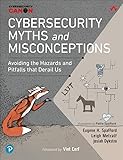Cybersecurity myths and misconceptions : avoiding the hazards and pitfalls that derail us
Material type: TextPublication details: Noida : Pearson, ©2023Description: xxxv, 380 p. : ill. ; 23 cmISBN:
TextPublication details: Noida : Pearson, ©2023Description: xxxv, 380 p. : ill. ; 23 cmISBN: - 9789361598777
- 005.8 SPA-C
| Item type | Current library | Collection | Call number | Status | Date due | Barcode | Item holds |
|---|---|---|---|---|---|---|---|
 Books
Books
|
IIITD General Stacks | Computer Science and Engineering | 005.8 SPA-C (Browse shelf(Opens below)) | Available | 013129 |
Browsing IIITD shelves, Shelving location: General Stacks, Collection: Computer Science and Engineering Close shelf browser (Hides shelf browser)

|

|

|

|

|

|

|
||
| 005.8 SMI-C The craft of system security | 005.8 SMI-C The craft of system security | 005.8 SMI-C The craft of system security | 005.8 SPA-C Cybersecurity myths and misconceptions : avoiding the hazards and pitfalls that derail us | 005.8 STA-C Computer security : | 005.8 STA-C Cryptography and network security : principles and practice | 005.8 STA-C Cryptography and network security : principles and practice |
Includes bibliographical references and index.
Part I. General issues.
Part II. Human issues.
Part III. Contextual issues.
Part IV. Data issues.
"Cybersecurity is fraught with hidden and unsuspected dangers and difficulties. Despite our best intentions, there are common and avoidable mistakes that arise from folk wisdom, faulty assumptions about the world, and our own human biases. Cybersecurity implementations, investigations, and research all suffer as a result. Many of the bad practices sound logical, especially to people new to the field of cybersecurity, and that means they get adopted and repeated despite not being correct. For instance, why isn't the user the weakest link? In Cybersecurity Myths and Misconceptions: Avoiding the Hazards and Pitfalls that Derail Us, three cybersecurity pioneers don't just deliver the first comprehensive collection of falsehoods that derail security from the frontlines to the boardroom; they offer expert practical advice for avoiding or overcoming each myth. Whatever your cybersecurity role or experience, Eugene H. Spafford, Leigh Metcalf, and Josiah Dykstra will help you surface hidden dangers, prevent avoidable errors, eliminate faulty assumptions, and resist deeply human cognitive biases that compromise prevention, investigation, and research. Throughout the book, you'll find examples drawn from actual cybersecurity events, detailed techniques for recognizing and overcoming security fallacies, and recommended mitigations for building more secure products and businesses."--


There are no comments on this title.